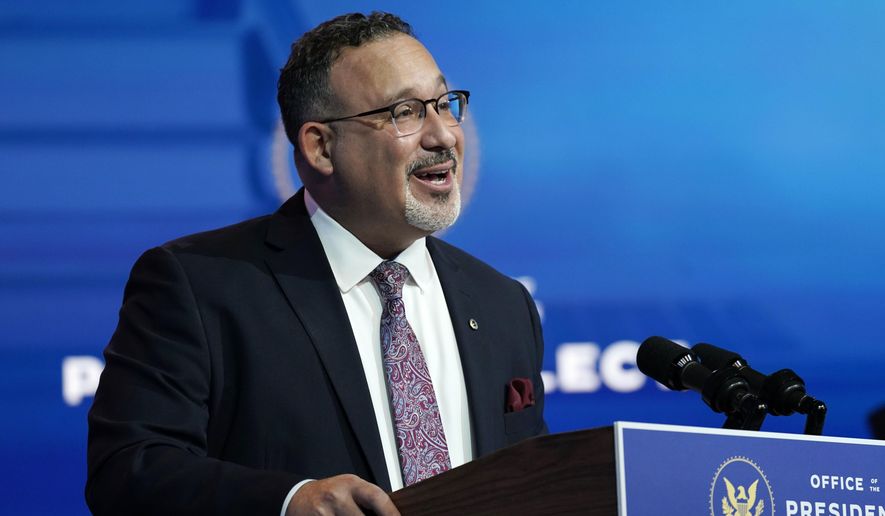President Joe Biden’s nominee for education secretary is pledging to counter the “frustration and distrust and fear” about reopening schools in the middle of a pandemic with clear guidance, expanded virus testing and a call for teachers to be prioritized in vaccine rollout plans.
But Miguel Cardona stopped short at a Senate hearing Wednesday of saying that all teachers should receive vaccines before being asked to return to the classroom, a demand being made by some teachers unions.
“We have great examples throughout our country of schools that have been able to reopen safely,” Cardona told the Senate Health, Education, Labor and Pensions Committee.
Cardona, 45, was questioned by senators on a range of topics before an expected confirmation vote. Washington Sen. Patty Murray, who leads the committee, said she plans to move quickly to bring Cardona’s nomination to a vote by the committee and the full Senate.
If approved, Cardona would oversee an Education Department that employs thousands and has an annual budget of more than $60 billion. He would also oversee the agency’s $1.5 trillion student loan portfolio.
But his most pressing job would be to coordinate a national effort to open schools. Biden has pledged to have most of the country’s K-8 schools within his first 100 days in office, and he is asking Congress for $130 billion to help make it happen.
Cardona said the administration will release new guidance based on scientific evidence to help schools make decisions. He also emphasized the need for more surveillance testing to detect the coronavirus among teachers and other employees.
But Cardona did not side with teachers unions in Chicago and other districts that say all teachers should receive vaccines before schools open. He said they should be prioritized, but when pressed on the question, he would go no further.
The head of the Centers for Disease Control and Prevention took a similar stance at a separate briefing Wednesday, saying schools can safely reopen even if teachers are not vaccinated for COVID-19.
“Vaccination of teachers is not a prerequisite for safe reopening of schools,” Dr. Rochelle Walensky said.
Although much of Biden’s school reopening strategy depends on congressional approval of his $1.9 trillion COVID-19 rescue plan, Cardona would have authority to settle some major policy questions. Chief among them is whether to let states cancel standardized tests this spring as the pandemic continues to rage. Some states have requested permission to forgo testing; some advocates view it as crucial to measure students’ learning loss.
Cardona appeared to support flexibility on the issue. Without testing, he said, it would be difficult to identify students who have fallen behind. But he rejected the idea of a “one-size-fits-all” solution.
“I don’t think we need to be bringing students in just to test them on standardized tests,” he said.
Biden’s proposed $130 billion in school money is meant to help schools upgrade ventilation systems, purchase protective equipment and hire more teachers, among other uses. Republicans have countered with a smaller proposal that has $20 billion for schools. But Cardona said the challenges brought by the pandemic won’t be fixed without significant dollars.
“If we really want to recover, we need to invest now - or we’re going to pay later,”
Some Republicans signaled fights with Cardona on topics including school choice and protections for transgender students.
In a tense exchange, Sen. Rand Paul, R-Ky., argued that it’s wrong for transgender girls to participate in girls’ sports. It’s the subject of a legal battle in Connecticut, where some cisgender athletes are challenging a state policy that lets transgender students participate as their identified gender. The Trump administration backed the suit. Cardona signaled support for transgender students.
“It’s critically important that education systems and educators respect the rights of all students, including students who are transgender,” he said.
On school choice, Cardona said it’s important that families have education options, but that a quality public school must be one of them. Public schools are “the bedrock of our country,” he said, adding that most students attend public schools.
For many Americans, the hearing was a first chance to hear Cardona’s stance on a range of topics. His December nomination moved him to the national spotlight after a meteoric rise from teacher to administrator to state education chief.
Before leading Connecticut’s education department, he was an assistant superintendent in Meriden, Connecticut, the school district that he attended as a child and where he later worked as an elementary school teacher. He has focused his career on closing education gaps and supporting bilingual education. It’s a personal issue for Cardona, who spoke only Spanish when he entered kindergarten.
His deep roots in public education helped him stand out as a contender to lead the Education Department. During his presidential campaign, Biden had promised to nominate someone with experience in public education. Biden was looking for someone who would contrast with Betsy DeVos, President Donald Trump’s education secretary.
Unlike DeVos, a Michigan billionaire who spent her career supporting school choice policies, Cardona is a champion of public schools who had a modest upbringing. He grew up in a public housing project in Meriden, raised by parents who came to Connecticut from Puerto Rico as children.
“Their own hard work empowered me to expand my horizons and become the first in my family to graduate college. While we didn’t always have a lot of material possessions, I was born rich,” Cardona told senators.
He studied education in college and went on to receive a doctorate from the University of Connecticut.
Cardona’s hearing had few of the gaffes or heated confrontations that marked DeVos’ confirmation hearing. In that 2017 hearing, DeVos suggested that guns may help protect rural schools from grizzly bears, and she struggled to distinguish between proficiency and growth when accessing student achievement.
Her confirmation required a tiebreaking vote from Vice President Mike Pence, and she remained a persistent target for Democrats in both chambers.




Please read our comment policy before commenting.